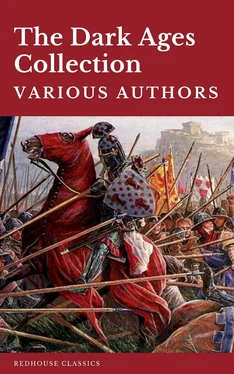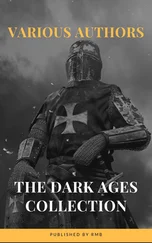The plan was to set on the throne one of the nephews of Anastasius, unfortunate victims of their kinship to an Emperor. For we must acquit them of any ambitious designs of their own. They had been well treated by Justin and Justinian, and their only desire was to live in peace. Pompeius and Hypatius were out of the reach of the insurgents; they and many other senators were with Justinian in the Palace. It was therefore decided to proclaim Probus Emperor, and the mob rushed to his house. But they did not find him, for, fearing what might happen, he had left the city. In their angry disappointment they burned his house.
It was assuredly high time for the Emperor to employ military force to restore order. But the Palace guards, the Scholarians and Excubitors, were unwilling to do anything to defend the throne. They had no feeling of personal devotion to Justinian, and they decided to do nothing and await events. Fortunately for Justinian there happened to be troops of a more irregular kind in the city, and two loyal and experienced commanders. Belisarius, who as Master of Soldiers in the East had been conducting the war against Persia, had recently been recalled, and he had in his service a considerable body of armed retainers, chiefly of Gothic 103race. Mundus, a general who had done good service in the defence of the Danube, was also in the capital with a force of Heruls. But all the soldiers on whom the Emperor could count can hardly have reached the number of 1500.
It was perhaps on Thursday (January 15) 104that Belisarius rode forth at the head of Goths and Heruls to suppress the revolution. There was a battle, possibly in the Augusteum; many were killed; but the soldiers were too few to win a decisive victory, and the attack only exasperated the people. The clergy, it may be noted, seem to have made some vain attempts to restore order. 105
During the two following days there was desultory street fighting, and another series of conflagrations. On Friday the mob again set fire to the Praetorium, which had only been partly damaged, but there was a strong north wind which blew the flames away from the building. They also set fire to the baths of Alexander, and the same wind carried the conflagration to the neighbouring hospice of Eubulus and hence to the church of St. Irene and the hospice of Sampson. On Saturday there was a conflict between the soldiers and the insurgents in the street which led northward from Middle Street to the Basilica and the quarter of Chalkoprateia. 106It would appear that some of the mob had occupied the Octagon, a building close to the Basilica, and the soldiers set it on fire. The same fatal north wind was blowing, and the flames, wafted southwards, spread to the church of St. Theodore Sphoracius and to the palace of Lausus, which was consumed with all its treasures, and thence raged along Middle Street, in the direction of the Forum of Constantine, destroying the colonnades and the church of St. Aquilina. 107We can imagine how great must have been the alarm in the Palace, which was almost in a state of siege. 108Justinian could not trust his guards, and he had strong and not unjustified suspicions that many of the senators who surrounded him were traitors. Fearing their treachery, he ordered them all to leave the Palace on Saturday at nightfall, 109except a few like the Cappadocian, whose loyalty was certain or whose interests were bound up with his own. He particularly suspected Hypatius and Pompeius, and when they protested against deserting him, his suspicions only grew stronger, and he committed the blunder of dismissing them.
On Sunday morning (January 18) the Emperor made an effort in person to pacify the people. He appeared in the Kathisma of the Hippodrome with a copy of the gospels in his hands, and a large crowd assembled. He swore on the holy book that he would grant an amnesty without any reservations and comply with the demands of his subjects. But the great part of the crowd was bitterly hostile. They cried, “You are perjuring yourself,” 110and “You would keep this oath to us as you kept your oath to vitalian.” And there were shouts of “Long live Hypatius!” Meanwhile it had become known that the nephews of Anastasius had left the Palace. The people thronged to the house of Hypatius, and in spite of his own reluctance and the entreaties of his wife Maria, who cried that he was being taken to his death, carried him to the Forum of Constantine, where he was crowned with a golden chain wreathed like a diadem.
A council was then held by Hypatius and the senators who were supporting his cause. 111Here we can see clearly that the insurrection was guided and fomented by men of high position who were determined to overthrow Justinian. The question was debated whether the Palace should be attacked immediately. One of the senators, Origen, advised delay. He proposed that the new Emperor should occupy for the moment one of the smaller Imperial palaces 112and prosecute the war against his rival with deliberation, leaving nothing to chance. But his advice did not prevail, and Hypatius, who was himself in favour of prompt action, proceeded to the Hippodrome and was installed in the Kathisma. The insurgents crowded the huge building in dense masses, and reviled Justinian and Theodora. 113
In the meantime, another council was being held in the Palace. The situation seemed desperate. To many, including the Emperor himself, there seemed no resource but escape by sea. John the Cappadocian recommended flight to Heraclea, and Belisarius agreed. This course would have been adopted had it not been for the intervention of the Empress Theodora, whose indomitable courage mastered the wavering spirits of her husband and his councillors. A writer, who may well have heard the scene described by Belisarius himself, professes to reproduce her short speech, and even his sophisticated style hardly spoils the effect of her vigorous words:
The present occasion is, I think, too grave to take regard of the convention that it is not meet for a woman to speak among men. Those whose dearest interests are exposed to extreme danger are justified in thinking only of the wisest course of action. Now in my opinion, on the present occasion, if ever, flight is inexpedient even if it should bring us safety. It is impossible for a man, when he has come into the world, not to die; but for one who has reigned it is intolerable to be an exile. May I never exist without this purple robe and may I never live to see the day on which those who meet me shall not address me as “Queen.” 114If you wish, O Emperor, to save yourself, there is no difficulty; we have ample funds. Yonder is the sea, and there are the ships. Yet reflect whether, when you have once escaped to a place of security, you will not prefer death to safety. I agree with an old saying that “Empire is a fair winding-sheet.” 115Theodora’s dauntless energy communicated itself to her hearers, and they resolved to remain and fight.
In the Hippodrome it was believed that they had already fled. Hypatius, we are told, still doubtful of his chances of success, had secretly sent a message to the Palace, advising Justinian to attack the people crowded in the Hippodrome. Ephraem, the messenger, gave the message to Thomas, an Imperial secretary, who, ignorantly or designedly, informed him that Justinian had taken to flight. 116Ephraem proclaimed the news in the Hippodrome, and Hypatius now played the Imperial part with confidence, but the people were soon undeceived.
Justinian sent out a trusted eunuch, named Narses, with a well-filled purse to sow dissensions and attempt to detach the Blue faction from the rebellion. 117He could insinuate that Hypatius, like his uncle, would be sure to protect their rivals the Greens, and remind them of the favour which Justinian had shown them in time past and of the unwavering goodwill of Theodora. While Narses fulfilled this mission, Belisarius and Mundus prepared to attack. At first Belisarius thought it would be feasible to reach the Kathisma directly from the Palace and pluck the tyrant from his throne. But the way lay through a building occupied by a portion of the guards, and they refused to let him pass. 118The Emperor then ordered him to lead his troops, as best he could, through the ruins of the Chalke into the Augusteum. With great difficulty, climbing through the debris of half-burnt buildings, they made their way round to the western entrance of the Hippodrome and stationed themselves just inside, at the portico of the Blues, which was immediately to the right of the Kathisma. 119In order to gain access to the Kathisma itself, it would have been necessary to pass though a small gate on the left, which was shut and guarded. If Belisarius attempted to force this gate, his men would have been exposed to an attack from the crowd in the rear. He therefore determined to charge the people. He drew his sword and gave the word. Though many of the populace had arms, there was no room in the dense throng to attempt an orderly resistance, and confronted by the band of disciplined soldiers the mob was intimidated and gave way. Moreover there were dissensions among them, for the bribes of Narses had not been fruitless. They were cut down without mercy, and then Mundus appeared with his Heruls to help Belisarius in the work of slaughter. Mundus had left the Palace by another way, and he now entered the Hippodrome by a gate known as Nekra. The insurgents were between two fires, and there was a great carnage. It was said that the number of the slain exceeded 30,000. 120
Читать дальше












